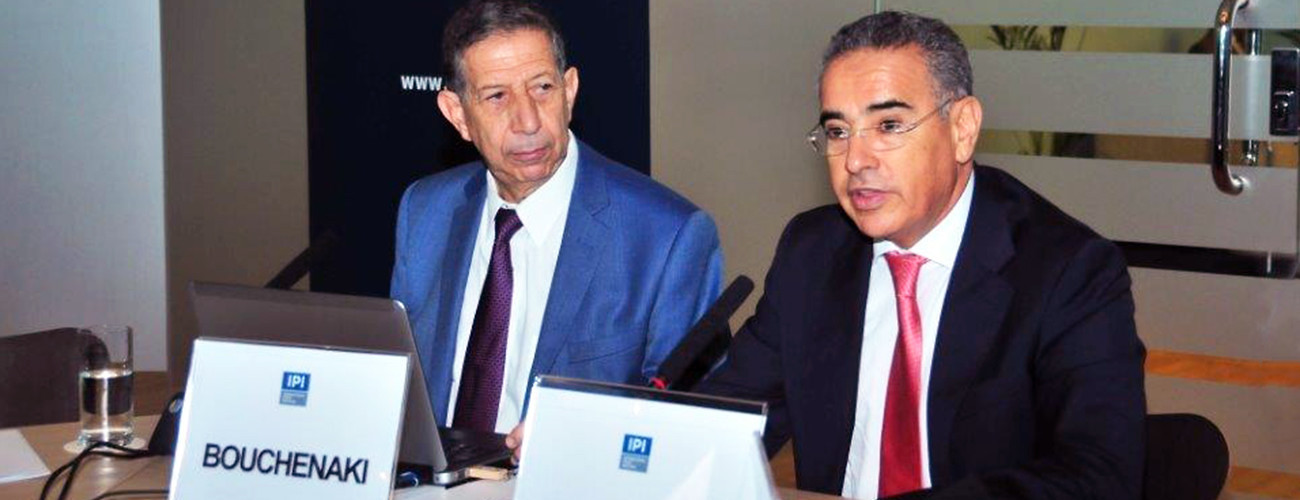Diplomats, government officials, religious leaders, civil society and media representatives joined members of IPI MENA’s International Advisory Board on May 26, 2015 to discuss the international community’s responsibility to protect the world’s heritage during armed conflicts.
In a presentation on “The Cultural Heritage During Armed Conflicts: International Community’s Duty & Right To Protect,” a survey on the serious losses inflicted upon major world heritage sites was made by Mounir Bouchenaki, Director, Arab Regional Centre for World Heritage (ARC-WH), Bahrain and Special Advisor to UNESCO Director-General For Culture. The presentation was introduced by IPI MENA Director Nejib Friji.
Mr. Bouchenaki detailed the major damage inflicted by radical religious groups to key world heritage sites in Afghanistan, Syria, Iraq, Yemen, Libya, and other MENA countries, including the recent terrorist attack that killed dozens of tourists and nationals in the prominent Bardo Museum in Tunis.
Mr. Bouchenaki said that, in line with the UN Security Council Resolution of February 15, 2015 and the UNESCO Chief Irina Bokova’s appeals to “Unite For Heritage” launched in Cairo last May, it is urgent to adopt and undertake special measures to protect and safeguard the rich and unique cultural heritage which became a target in a number of Arab countries’ theaters of armed conflicts based on extremism, ignorance, and intolerance.
Mr. Bouchenaki added, “At the present time, where extremist groups are distorting the message of the Islam as an argument for erasing the human heritage, the role of religious leaders in the Islamic world is fundamental in order to strongly condemn the destruction of cultural heritage and the illicit traffic of cultural properties.” He quoted the Grand Imam of Al Azhar as telling UNESCO Director General, “Islamic civilization is a civilization of recognition and connection.”
He urged governments, civil society networks, and individuals to work together to protect the world’s heritage, adding “we appeal to the international community to consider damage to world heritage sites and other historical places as a war crime and punish the offenders.”
Hatun Demirer, Ambassador of Turkey, said, “There are many historical monuments and buildings in the Balkans, the Middle East, and North Africa which once constituted Ottoman Empire territory,” adding that “ Turkey spares no effort to preserve this cultural heritage.”
She denounced “terrorist groups’ destruction of historical monuments,” equating it to “destroying the history and culture of several generations.” She stressed, “We should teach our children the value of our cultural heritage, and this subject should become a part of national curricula.” She called for “strong national and international legislations to end the illicit trade of cultural artefacts.”
Amani Soliman, formerly of the UNESCO Iraq office, said, “My colleagues and I found that it was increasingly difficult to implement our projects and programs due to the very rigid security measures imposed on UN staff” working in conflict-torn areas. She added, “We had to delegate many responsibilities to local staff and partners. This raised a number of trust issues in an environment as divided as Iraq.”
“To what extent can our efforts be effective?” she wondered.
Fawzi Abdulal, Former Interior Minister of Libya and current Ambassador to Bahrain, expressed regret “that assaults against world heritage sites in Muslim countries stem from misunderstanding and distortion of the religious texts.” He urged Muslim states to put additional efforts to curb this destructive agenda.
Ebrahim Nonoo, a representative of the Jewish community, said, “There must be a link between UNESCO and the society communities to promote respect for heritage sites. This linkage needs to have some relevant obligation by groups in society to ensure respect for the sites.” He wondered whether this interaction existed.
Imam Salah Aljowder urged all religious leaders to “devote their sermons and campaigns to promote the protection of the world’s heritage.” He pledged to devote parts of his Friday’s sermon to the need to protect heritage and decry using Islam in the intolerable destruction of the world’s cultural wealth.
Related Coverage:
Bahrain tops the ladder in helping to preserve heritage sites (24×7 News, May 27, 2015)
Bahrain base for archaeologists…(Gulf Daily, May 27, 2015)
Signs of Past (Daily Tribune, May 27, 2015)
In Arabic:
Al Watan, May 27, 2015
Al Wasat, May 27, 2015
Al Bilad, May 27, 2015
Al Ayam, May 27, 2015
Akhbar Alkhaleej, May 27, 2015








